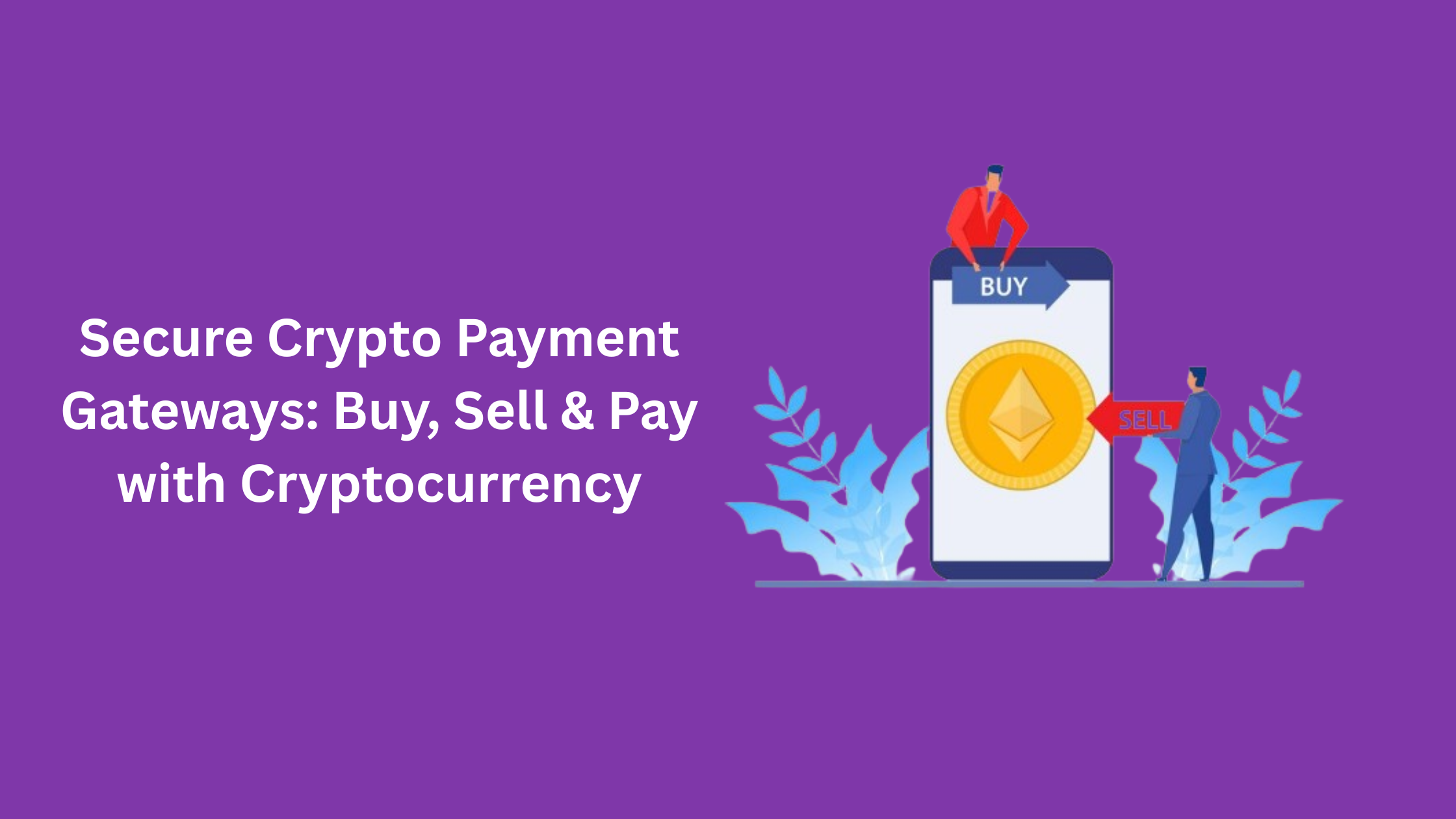Cryptocurrencies are reshaping how we think about value, commerce, and financial autonomy. Today, it’s not just investors or early adopters who want to use digital assets everyday consumers, businesses, and platforms are seeking ways to buy and sell crypto, pay for goods and services, and accept digital money securely and efficiently. At the center of this shift stands the crypto payment gateway: a technology driving trust, convenience, and everyday use of cryptocurrencies in 2025.
This article demystifies how these gateways work, why they matter, and how they make buying, selling, and spending digital assets safer and easier than ever.
What Is a Crypto Payment Gateway?
A crypto payment gateway is a digital platform or service that lets merchants accept payments in cryptocurrencies such as Bitcoin, Ethereum, or stablecoins. The crypto payment gateway acts as an intermediary, managing complicated blockchain processes on behalf of both the customer and the business. By doing so, they offer speed, security, and transparency while significantly lowering payment friction and the need for a business to be a blockchain expert.
Gateways don’t just stop at accepting payments, they handle conversions, compliance, and security, so merchants don’t have to worry about the complexities of the crypto world.
How Does a Crypto Payment Gateway Work?
Let’s break down the typical workflow when a customer chooses to pay with cryptocurrency at checkout:
- Customer Chooses Crypto at Checkout: Shoppers select their preferred crypto and trigger the payment gateway.
- Invoice and Address Generation: The gateway creates a payment request with a fixed amount in digital currency, a unique wallet address, and often a QR code. Rates are usually locked for a few minutes to protect the merchant and customer from volatility.
- Customer Transfers Funds: The buyer sends the precise crypto amount from their wallet to the address provided. This transaction is recorded on the blockchain.
- Blockchain Confirmation: The payment gateway monitors the blockchain and waits for the transaction to be confirmed. Most gateways require a certain number of confirmations (blocks) before marking the transaction as complete.
- Settlement and Notifications: Once confirmed, the gateway can instantly convert funds to the merchant’s preferred fiat currency or deposit crypto directly, depending on settings. Both parties receive confirmation, and the order or service is processed.
By automating these steps, crypto payment gateways eliminate manual tracking, errors, and the technical burden from both buyers and sellers.
Why Not Use a Personal Crypto Wallet for Payments?
While anyone can directly buy and sell crypto or accept payments using their personal wallet, most businesses prefer to use gateways for several reasons:
- Simplified processes: No need to manually track transactions or reconcile addresses.
- Automatic conversion: Instantly swap crypto to fiat to avoid price swings or unfamiliar “holding.”
- User-friendly integrations: Connect seamlessly to e-commerce platforms, apps, or POS systems.
- Security and compliance: Fraud checks, KYC, and anti-money-laundering rules are often managed by the gateway.
Without a payment gateway, managing large numbers of payments, refunds, and multinational compliance becomes labor-intensive and risky.
The Power and Simplicity of Secure Payment Gateways
Crypto payment gateways aren’t just technical tools, they’re business enablers. Top platforms in 2025 like NOWPayments, CoinGate, BitPay, and Coinbase Commerce have become user-friendly, easy to integrate, and packed with features originally found only in big financial systems.
Key features include:
- Support for hundreds of cryptocurrencies
- Automatic conversion to fiat or stablecoins
- Real-time analytics and reporting dashboards
- Seamless integration by API, plug-ins, or invoices
- Robust fraud prevention and compliance monitoring
- Instant or periodic fiat settlements into bank accounts
Gateways now serve businesses of every size, from global retailers to small e-commerce startups, giving all players the confidence to accept and spend crypto.
Buy and Sell Crypto Directly via Gateways
Today’s crypto payment gateways go well beyond enabling payments. Many now offer buy and sell crypto services, helping users instantly swap fiat for digital assets (or vice versa) within the same system.
Why is this important?
- Frictionless onramps: Customers new to crypto can purchase with cards, bank transfers, or digital wallets and spend instantly.
- Seamless payouts: Sellers, freelancers, or merchants can instantly liquidate crypto receipts to fiat or another coin as needed.
- Trusted workflow: No need for users to register on multiple exchanges, face repeated verification, or transfer between wallets.
- Increased adoption: Businesses can market directly to crypto-first audiences, who now have more flexible ways to engage.
Platforms like NOWPayments and CoinGate empower merchants and users to not only receive but also buy and sell crypto effortlessly.
Security and Compliance Not Optional
As with all financial transactions, security is paramount. Crypto payment gateways implement strong security practices:
- Private key management: Merchants do not need to handle or store private keys minimizing hacking risks.
- Encryption: Data and funds are protected at rest and in transit.
- Real-time fraud detection: Block suspicious transactions before they occur.
- Regulatory compliance: Gateways handle KYC, AML, and evolving regional rules so merchants can operate globally without getting entangled in red tape.
By combining advanced technology with robust compliance, these gateways build trust with both customers and regulators.
Use Cases: How Gateways Power the Real World
- E-commerce Stores: Offer instant checkout with crypto for physical and digital goods, with auto-conversion to protect profits.
- Freelancers and Service Providers: Get paid from anywhere, in any major digital currency, with convenient settlement options.
- International Businesses: Settle cross-border invoices instantly, no more wire delays or currency conversion headaches.
- Subscription and Donation Services: Enable recurring payments or donations with top coins and tokens.
Real businesses are seeing faster payments, lower expenses, and increased sales thanks to their crypto payment gateway.
How to Choose the Right Crypto Payment Gateway
With dozens of options available, consider these criteria when evaluating a gateway for your platform or business:
- Supported currencies: Does it support the coins and tokens your customers use?
- Integration ease: Are there plug-ins, APIs, or no-code solutions for your site/app?
- Security credentials: Look for third-party audits, bug bounty programs, and transparent reporting.
- Instant conversion and settlement: Can you choose to hold crypto or receive fiat?
- Fee structure: Clear, competitive pricing with no hidden fees.
- Customer support: Responsive help for both merchants and buyers.
Looking Forward: The Future of Crypto Payment Gateways
The current generation of gateways is becoming more connected, smarter, and easier to use. Trends to watch include:
- Seamless buy and sell crypto APIs embedded into mainstream checkout experiences.
- Mobile-first integrations for in-person and e-commerce adoption.
- Integration with decentralized finance (DeFi) for instant lending, staking, and more.
- More intuitive compliance and onboarding smart KYC, risk scoring, and user-driven privacy features.
Conclusion
The age of cryptocurrency in payments is no longer on the horizo it’s here. Crypto payment gateways sit at the center, making it possible for anyone to buy and sell crypto, pay with digital assets, and participate in the future of open, borderless finance with security and ease.
By choosing the right solution, businesses and consumers can unlock new freedom and opportunity, all while enjoying seamless, secure, and compliant transactions today and tomorrow.


